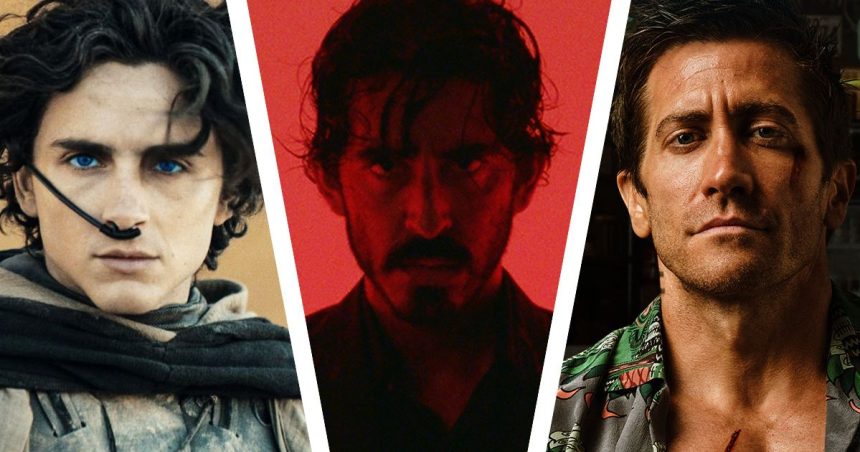Why use your own weapon when you can use the one your enemy just stabbed you with?
Photo-Illustration: Vulture; Photos: Warner Brothers, Universal Pictures, Amazon
Pulling a weapon out of your own battered flesh and using it against the person who originally wielded it is a classic fight move — the ultimate gruesome but impressive show of determination. It’s an act of aggression by way of self-sacrifice, demonstrating that even being basically dead is not enough to stop your boundless badassery. Which may be why the move, while far from new onscreen, has become so in vogue among the current crop of sad-eyed action heroes.
It’s how Dev Patel’s Kid completes his lifelong quest for revenge in Monkey Man, not against some hulking bruiser or expert martial artist but a silver-haired guru who’s been using a veneer of holiness to accrue power and wealth for himself and his corrupt pals. Baba Shakti (Makarand Deshpande) is more master manipulator than physically intimidating final boss, but he does have two things going for him. He’s good at spouting off pieties about cycles of violence that may not sway Dev Patel’s avenging character but does buy some time. Also, he’s got blades hidden in the wooden sandals he holds aloft like a teaching prop, the first of which he uses to stab Kid in the guts when our hero glances away. The situation seems dire until Kid catches what’s meant to be a fatal blow from Baba Shakti’s second blade — right through his palm. He twists the dagger from the grasp of his shocked foe, then pulls it out of his own bloodied hand in order to use it to repeatedly stick the guy in the chest and then through the forehead.
It’s also how Jake Gyllenhaal’s Dalton ultimately defeats Conor McGregor’s manic baddie Knox in the recent Road House remake, during their big free-for-all in the wreckage of the bar Dalton was hired to clean up. Toward the end of their fight, Knox grabs the sharp remnant of a chair and plunges it into Dalton’s flank, leaving Dalton gasping on the ground. But then, to the strains of his MMA walkout song “Enter Sandman,” Dalton rallies, grabs Knox’s arm to prevent the guy from executing him with another piece of wood, and yanks the shard out of his body to jab it into Knox’s thigh. He grabs the stake from Knox’s hand and, in a laugh-out-loud bit of excess, proceeds to aerate the dude with both ad hoc weapons like Knox is a potato about to go in the microwave.
It’s more outrageous than what goes down between Paul Atreides (Timothée Chalamet) and Feyd-Rautha (Austin Butler) when they have their sunset duel at the end of Dune: Part Two, but the basic outlines are the same — Feyd even knifes Paul in basically the same spot on his left torso that Dalton gets stabbed in. Like Kid, Paul agonizingly intercepts a killing blow with his hand, grabbing the second blade Feyd comes at him with to end things and guiding it instead into his shoulder. The two are in such close proximity that it takes a beat for us to see that Paul’s used the distraction to give his enemy a fatal wound with the knife he’s pulled out of his own side.
If this particular finishing move happens to be having a moment, it’s not because it’s a confirmation of imperviousness to pain, but rather the opposite — a willingness to embrace and become a vessel for suffering. Vin Diesel, the Rock, and Jason Statham may all contractually not be allowed to lose fights onscreen, but the kind of action hero that Chalamet, Gyllenhaal, and Patel are playing isn’t made of iron and attitude. He’s a hard-bodied soft boy, one who gets hurt a lot, emotionally as well as physically, which is why all these characters are so haunted by their pasts and what they have to do in the future even before they begin taking sharp objects to the abdomen.
If you want to take the symbolism even further, you can see something Jesus-y in those wounds on the side, which fits with the ways in which these characters are all martyrs, giving up their loves, their careers, and their lives for some greater cause. But that’s overthinking things. There are only so many dramatic conclusions to a fight that the human imagination can come up with, and this one’s rolled back around in time to coincide with our new tide of heroes. Muscle-movie protagonists with bulging biceps may be symbols of a stereotypical alpha-male dominance, but these guys get penetrated in addition to being the ones doing the piercing.












